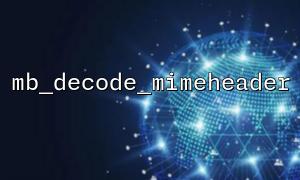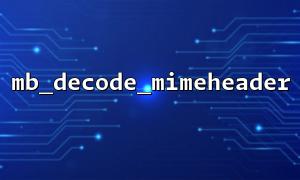MIME (Multipurpose Internet Mail Extensions) is an extension protocol for internet email, widely used for transmission and encoding. MIME encoding is typically used to convert text in non-ASCII character sets into ASCII strings so that it can be properly displayed in emails. For example, Chinese, Japanese, and other characters need to be MIME-encoded before they can be correctly transmitted.
mb_decode_mimeheader is a function provided by the mbstring extension in PHP, used to decode MIME-encoded email headers.
iconv_mime_decode is a function provided by the iconv extension in PHP, also used for decoding MIME-encoded email headers.
Although their functions are similar, their implementation and processing methods differ. Understanding these differences is essential for developers working with different types of email header encodings.
<span><span><span class="hljs-title function_ invoke__">mb_decode_mimeheader</span></span><span>(</span><span><span class="hljs-keyword">string</span></span><span> </span><span><span class="hljs-variable">$string</span></span><span>): </span><span><span class="hljs-keyword">string</span></span><span>
</span></span>mb_decode_mimeheader is used to decode MIME-encoded strings. It decodes according to the character encodings supported by the mbstring extension and returns a plain string.
Parameter:
$string: The MIME-encoded string to be decoded.
Return Value:
The decoded string, usually converted to the appropriate character set.
Example:
<span><span><span class="hljs-comment">// Assume the email header is encoded as: =?UTF-8?B?5a2Q5rW3?=</span></span><span>
</span><span><span class="hljs-variable">$encoded</span></span><span> = </span><span><span class="hljs-string">"=?UTF-8?B?5a2Q5rW3?="</span></span><span>;
</span><span><span class="hljs-variable">$decoded</span></span><span> = </span><span><span class="hljs-title function_ invoke__">mb_decode_mimeheader</span></span><span>(</span><span><span class="hljs-variable">$encoded</span></span><span>);
</span><span><span class="hljs-keyword">echo</span></span><span> </span><span><span class="hljs-variable">$decoded</span></span><span>; </span><span><span class="hljs-comment">// Output: 中文</span></span><span>
</span></span><span><span><span class="hljs-title function_ invoke__">iconv_mime_decode</span></span><span>(</span><span><span class="hljs-keyword">string</span></span><span> </span><span><span class="hljs-variable">$string</span></span><span>, </span><span><span class="hljs-keyword">int</span></span><span> </span><span><span class="hljs-variable">$mode</span></span><span> = </span><span><span class="hljs-number">0</span></span><span>, </span><span><span class="hljs-keyword">string</span></span><span> </span><span><span class="hljs-variable">$encoding</span></span><span> = </span><span><span class="hljs-literal">null</span></span><span>): </span><span><span class="hljs-keyword">string</span></span><span>
</span></span>iconv_mime_decode is used to decode MIME-encoded strings and returns the decoded string. It supports multiple character encodings and decoding modes, offering greater flexibility.
Parameters:
Return Value:
Example:
<span><span><span class="hljs-comment">// Assume the email header is encoded as: =?UTF-8?B?5a2Q5rW3?=</span></span><span>
</span><span><span class="hljs-variable">$encoded</span></span><span> = </span><span><span class="hljs-string">"=?UTF-8?B?5a2Q5rW3?="</span></span><span>;
</span><span><span class="hljs-variable">$decoded</span></span><span> = </span><span><span class="hljs-title function_ invoke__">iconv_mime_decode</span></span><span>(</span><span><span class="hljs-variable">$encoded</span></span><span>);
</span><span><span class="hljs-keyword">echo</span></span><span> </span><span><span class="hljs-variable">$decoded</span></span><span>; </span><span><span class="hljs-comment">// Output: 中文</span></span><span>
</span></span>Both mb_decode_mimeheader and iconv_mime_decode are powerful tools for handling MIME encoding, each with its unique strengths. The choice between them depends on your specific needs:
By understanding these differences, you can choose the most appropriate decoding function for the right scenario, enhancing both compatibility and stability of your code.



